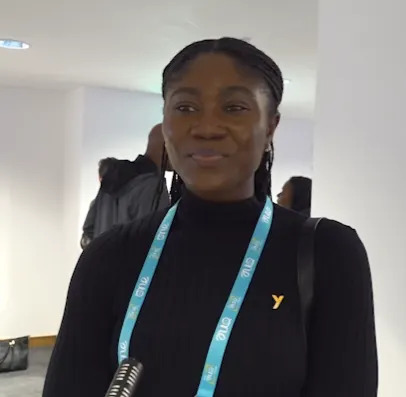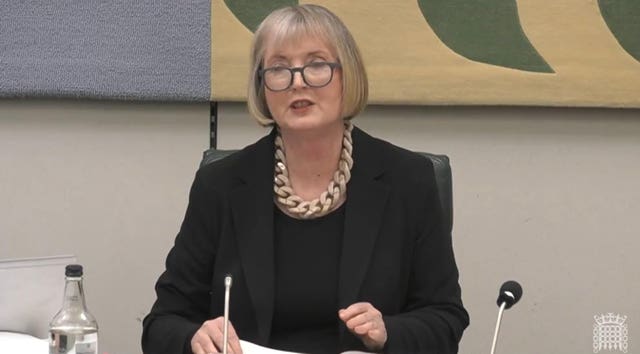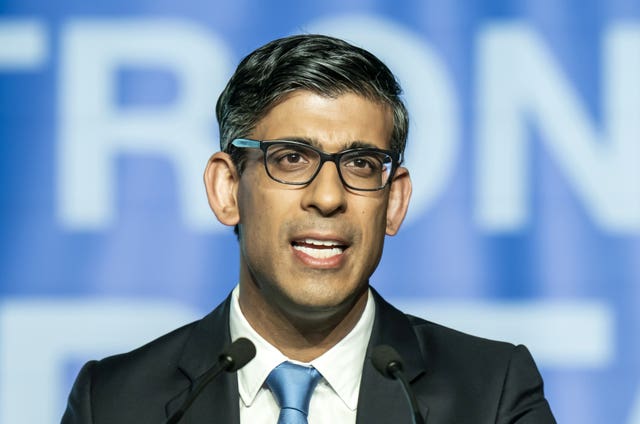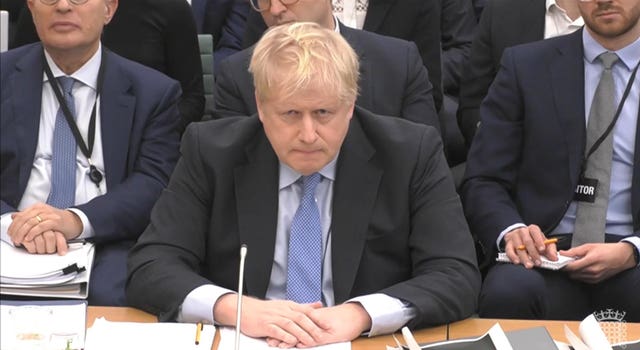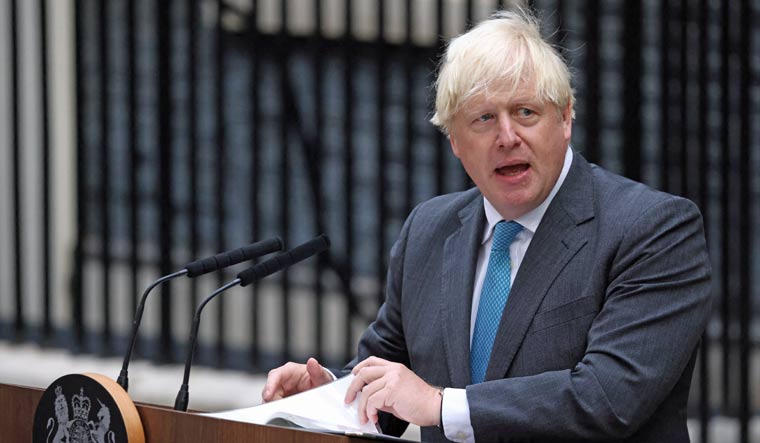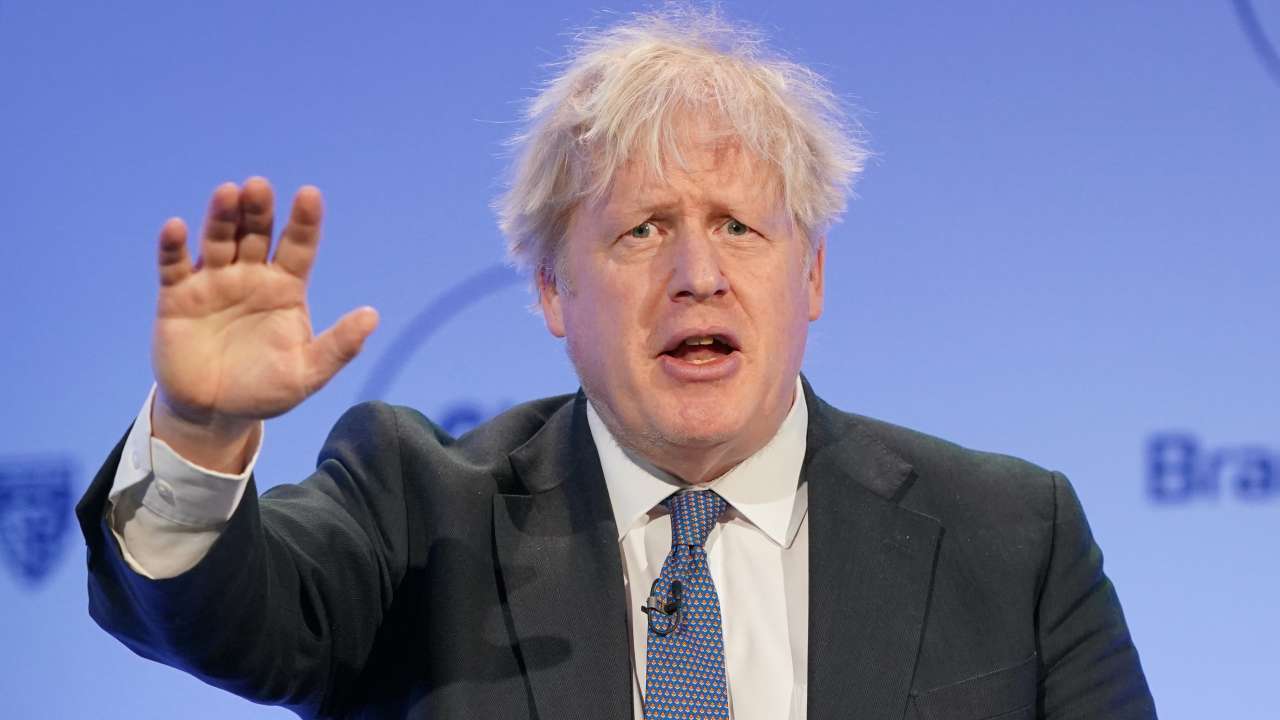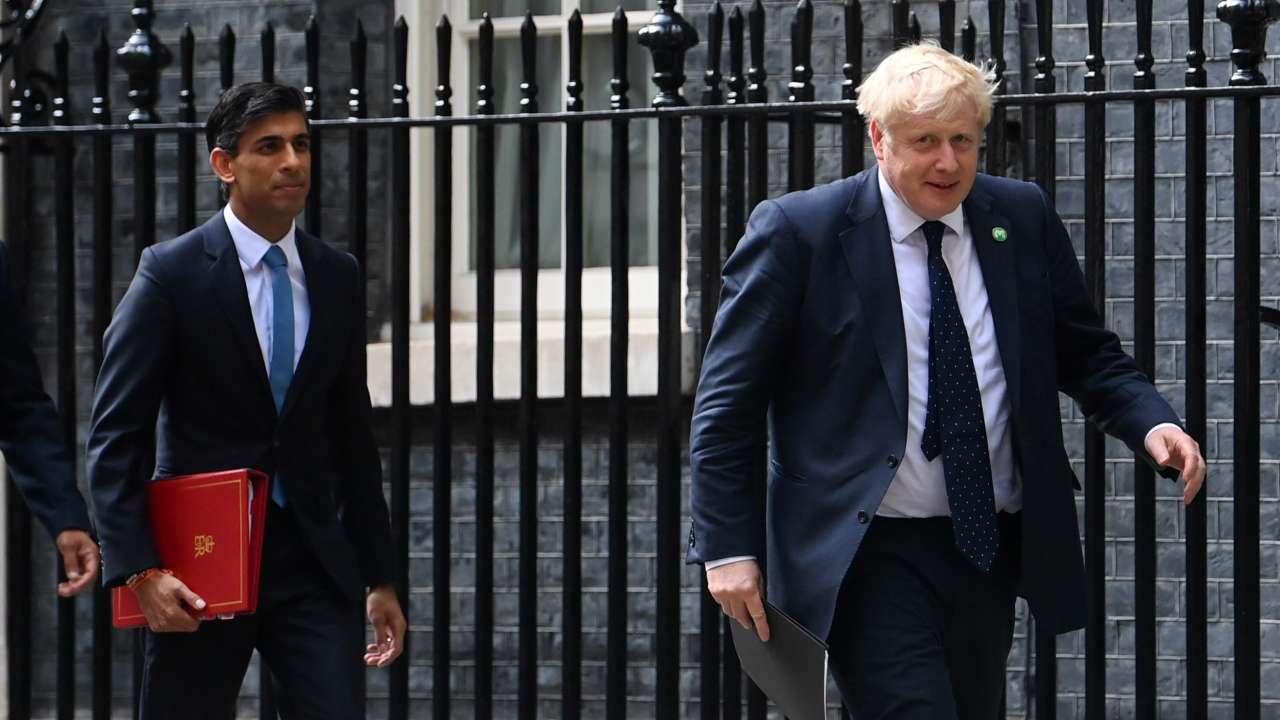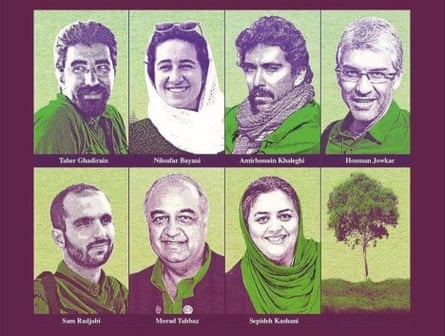'This is a triumph of emotional storytelling, bracing and brave,' said judge Esi Edugyan
:quality(70)/cloudfront-eu-central-1.images.arcpublishing.com/thenational/7RIPYBG4D633VS74Y5FAXFHNJA.jpg)
Paul Lynch, author of 'Prophet Song', accepts the 2023 Booker Prize. EPA
Simon Rushton
Nov 26, 2023
Irish writer Paul Lynch won the 2023 Booker Prize on Sunday for his novel Prophet Song, the story of a family and a country on the brink of catastrophe as an imaginary Irish government veers towards tyranny.
Lynch, 46, was presented with his trophy by last year's winner Shehan Karunatilaka, at a ceremony held in London.
The writer, who lives in Dublin, is the fifth Irish author to win the award, worth £50,000 ($63,000) after Dame Iris Murdoch, John Banville, Roddy Doyle and Anne Enright.
The event on Sunday had a keynote speech delivered by Nazanin Zaghari-Ratcliffe, who was released from a prison in Iran last year.
Canadian writer Esi Edugyan, chairwoman the judging panel, said the book was “a triumph of emotional storytelling, bracing and brave” in which Lynch “pulls off feats of language that are stunning to witness”.
Ms Edugyan said Lynch’s book “captures the social and political anxieties of our current moment” but also deals with “timeless” themes.
The novel, Lynch's fifth, seeks to show the unrest in western democracies and their indifference towards disasters such as the implosion of Syria.
“From that first knock at the door, Prophet Song forces us out of our complacency as we follow the terrifying plight of a woman seeking to protect her family in an Ireland descending into totalitarianism,” Ms Edugyan said.
:quality(70)/cloudfront-eu-central-1.images.arcpublishing.com/thenational/N42QCTC4V37OLY2T23FD64Q6MY.jpg)
Lynch, who was previously the chief film critic of Ireland’s Sunday Tribune newspaper, said he wanted readers to understand totalitarianism by heightening the dystopia with the intense realism of his writing.
“I wanted to deepen the reader's immersion to such a degree that by the end of the book, they would not just know, but feel this problem for themselves,” he said.
Past winners of the Booker, which was first awarded in 1969, include Margaret Atwood, Salman Rushdie and Yann Martel.
The island of Ireland has had one more Booker win, Northern Irish writer Anna Burns in 2018.
Ms Zaghari-Ratcliffe spoke about reading during her imprisonment in Iran.
“Books helped me to take refuge into the world of others when I was incapable of making one of my own,” she said.
“They salvaged me by being one of the very few tools I had, together with imagination, to escape the Evin [prison] walls without physically moving.”
“One day a cellmate received a book through the post. It was The Handmaid's Tale by Margaret Atwood, translated into Farsi.
“Who thought a book banned in Iran could find its way to prison through the post? We hid the cover in newspapers to hide it from the camera.”
She said inmates wanted to read the book, as did a guard.
Irish author Paul Lynch wins 2023 Booker Prize
By AFP
November 26, 2023
Irish writter Paul Lynch with his 2023 Booker Prize-winning novel 'Prophet Song'
- Copyright AFP Saidu BAH
Clara LALANNE
Irish author Paul Lynch won the 2023 Booker Prize for fiction on Sunday for his novel “Prophet Song,” a dystopian work about an Ireland that descends into tyranny.
The 46-year-old pipped five other shortlisted novelists to the prestigious award at a ceremony in London
He becomes the fifth Irish writer to win the high-profile literary prize, which has propelled to fame countless household names, including past winners Salman Rushdie, Margaret Atwood and Hilary Mantel.
“This was not an easy book to write,” Lynch said after collecting his award, which comes with £50,000 (around $63,000) and a huge boost to his profile.
“The rational part of me believed I was dooming my career by writing this novel. Though I had to write the book anyway. We do not have a choice in such matters,” he added.
Lynch’s book is set in Dublin in a near future version of Ireland. It follows the struggles of a mother of four as she tries to save her family from totalitarianism.
There are no paragraph breaks in the novel, which is Lynch’s fifth.
Canadian novelist Esi Edugyan, who chaired the five-person judging panel, called the story “a triumph of emotional storytelling, bracing and brave”.
“With great vividness, Prophet Song captures the social and political anxieties of our current moment,” she said.
“Readers will find it soul-shattering and true, and will not soon forget its warnings.”
The Booker is open to works of fiction by writers of any nationality, written in English and published in the UK or Ireland between October 1, 2022, and September 30, 2023.
– Murdoch, Doyle –
None of this year’s six finalists — which included two Americans, a Canadian, a Kenyan and another Irish author — had been shortlisted before and only one had previously been longlisted.
The shortlisted novels, announced in September, were chosen from a 13-strong longlist that had been whittled down from an initial 158 works.
Among them was Irish author Paul Murray’s “The Bee Sting”, a tragicomic saga which looks at the role of fate in the travails of one family.
Murray was previously longlisted in 2010.
Kenyan writer Chetna Maroo’s moving debut novel “Western Lane” about grief and sisterhood follows the story of a teenage girl for whom squash is life.
The judges also selected “If I Survive You” by US writer Jonathan Escoffery, which follows a Jamaican family and their chaotic new life in Miami.
He was joined by fellow American author, Paul Harding, whose “This Other Eden” — inspired by historical events — tells the story of Apple Island, an enclave off the US coast where society’s misfits flock and build a new home.
Canada was represented on the shortlist in the shape of “Study for Obedience” by Sarah Bernstein. The unsettling novel explores the themes of prejudice and guilt through a suspicious narrator.
The Booker was first awarded in 1969. Last year’s winner was Sri Lankan writer Shehan Karunatilaka for “The Seven Moons of Maali Almeida”.
The previous Irish winners are Iris Murdoch, John Banville, Roddy Doyle and Anne Enright.
Opinion (NOT A REVIEW)
This year's Booker winner is political fiction at its laziest
THE TELEGRAPH
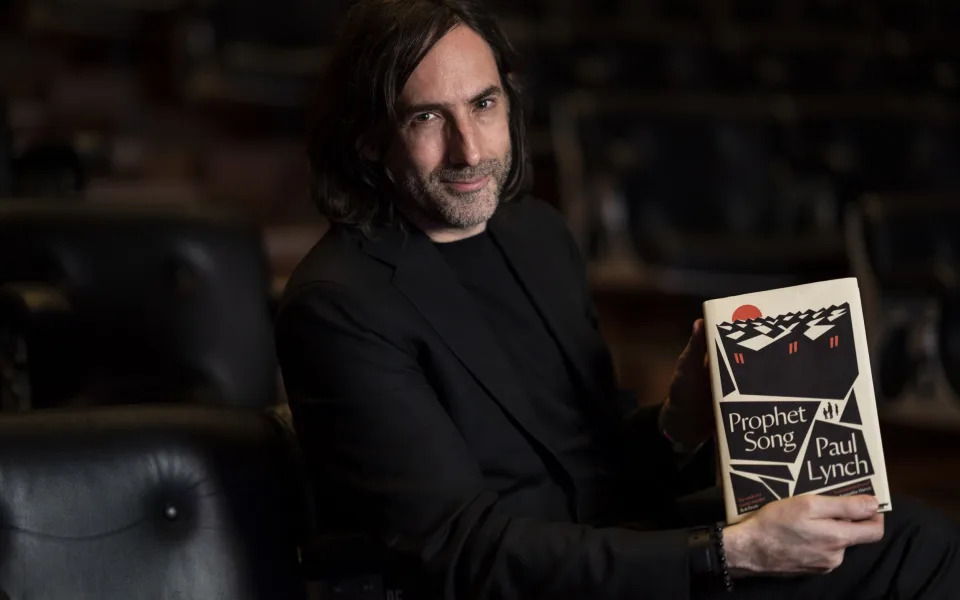
Showing civilisation on the brink: Paul Lynch - David Levenson/Getty Images Europe
I should have seen this coming. For the last four years, the Booker Prize has alternated between picking the right book and the very wrong. Last year, it went to Shehan Karunatilaka for The Seven Moons of Maali Almeida, a comic thriller set in Sri Lanka and the afterlife. That novel was a deserving winner, quick-witted and spry in style. According to the pendulum, then, 2023 would go awry.
And so it has. Though the shortlist was the strongest in years, Paul Lynch’s Prophet Song was by some distance the weakest link. In Britain, and his native Ireland, Lynch’s novels are well-regarded, but none of the previous four have been runaway hits. (On the other hand, the Americans admire him, and he’s oddly successful in France.) His style has a self-serious beauteousness; reviewing Prophet Song for this paper, Declan Ryan described it as “darkly lyrical, rich and somewhat stylised”. Several critics have even gestured to Cormac McCarthy, a comparison Lynch must like: he has used the latter’s sparse, magisterial writing for one of this novel’s three epigraphs.
Prophet Song, like some of McCarthy’s work, shows civilisation on the brink. In a totalitarian Ireland – secret police, arbitrary arrest – a molecular biologist, Eilish, loses her husband to the machine. She decides she must rebel, but she’s quickly isolated at work, and when a civil war erupts, her children slip from her control, while the distance to her father, who has dementia and lives across town, becomes a terrifying gulf. The conflict soon reaches Dublin: homes are destroyed, the lines of contact shift, Eilish and co become unmoored.
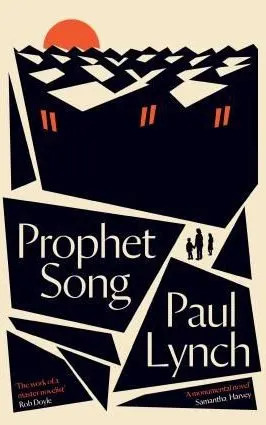
Booker chair Esi Edugyan said that Prophet Song "forces us out of complacency" - Handout
Lynch has described Prophet Song as allegorical: “Why are we in the West so short on empathy for the refugees flooding towards our borders? [The novel] is partly an attempt at radical empathy.” He wanted to bring the crisis home to the West, and make readers identify with those displaced. Upon his victory, Esi Edugyan, chair of this year’s judges, declared that Prophet Song “forces us out of our complacency” and “captures the social and political anxieties of our current moment”. Readers, she added, “will not soon forget its warnings”.
The problem is how she, and Lynch, imagine political fiction to work. There isn’t much to be gained from slamming morals upon the table. Most people who care about an issue as big as the refugee crisis already know what they think. “That could be me, were I not in the West” is the most basic thought any person can have.
Allegories are hard to craft well, because once they’re solved, the bulk of the text can seem like mere ornament. You can add explosions, and make them exciting, but that’s not the same thing as making them resonate. The purpose of Prophet Song is obvious early, so its success relies on how it’s told; yet Lynch’s prose is undisciplined, overwritten and often illogical, as when Eilish muses on the “easterly breeze blowing cold hell upon Bull Island yet cooling the mind to think”. Nor are the plot and the pacing impressive. Lynch is a film critic too, and it shows. Too many novels wish they were prestige TV scripts; this one thinks it’s in Hollywood.
The disappointment is all the more bitter, because the judges had the opportunity to reward what fiction, and only fiction, can do. They could have gone for Chetna Maroo’s Western Lane, Jonathan Escoffery’s If I Survive You, or Paul Harding’s This Other Eden – all superior books – while I half-expected the winner to be Paul Murray’s The Bee Sting, about the disintegration of an Irish family. It has been lavishly overpraised, but in its thematic breadth, physical length and (slightly strained) humour, it was at least obvious “Booker bait”.

Overturning perceptions: Sarah Bernstein's Study for Obedience was a strong contender - Alice Meikle
But I had hoped they would give the Prize to Study for Obedience by Sarah Bernstein, which – as I wrote last weekend – was my novel of the year. I haven’t believed since 2020, and Shuggie Bain, that someone deserved the Booker more. Study for Obedience and Prophet Song have a similar pivot: an isolated figure, an ambient threat. Bernstein’s novel is about a woman who moves to a “cold and faraway land”; her heritage, which we slowly learn is Jewish, sees the locals react with menace and fear. Her character makes the situation stranger still: she longs to be obedient, subservient, to abnegate her autonomy and dissolve into a group.
She’s no Hollywood heroine, in other words: no solitary figure defying the world. And so much isn’t stated outright; your sympathies keep being unsettled, your perception overturned. What is she thinking, and the locals doing, and what are the desires or hopes or self-loathing beneath it all? Study for Obedience could never be called an allegory – if anything, it’s a rebuke to those who like their stories trite.
The irony, then, is this: the Booker Prize could have gone to a political novel, one that does “force us out of our complacency”, and that represents, per the rubric, “the best sustained work of fiction” this year. It would have been a novel in which politics and fiction were interwoven subtly, and still have me thinking five months on. Yet the judges overlooked it – and, worst of all, on the same terms by which they picked Lynch. Come back next year, I guess.




